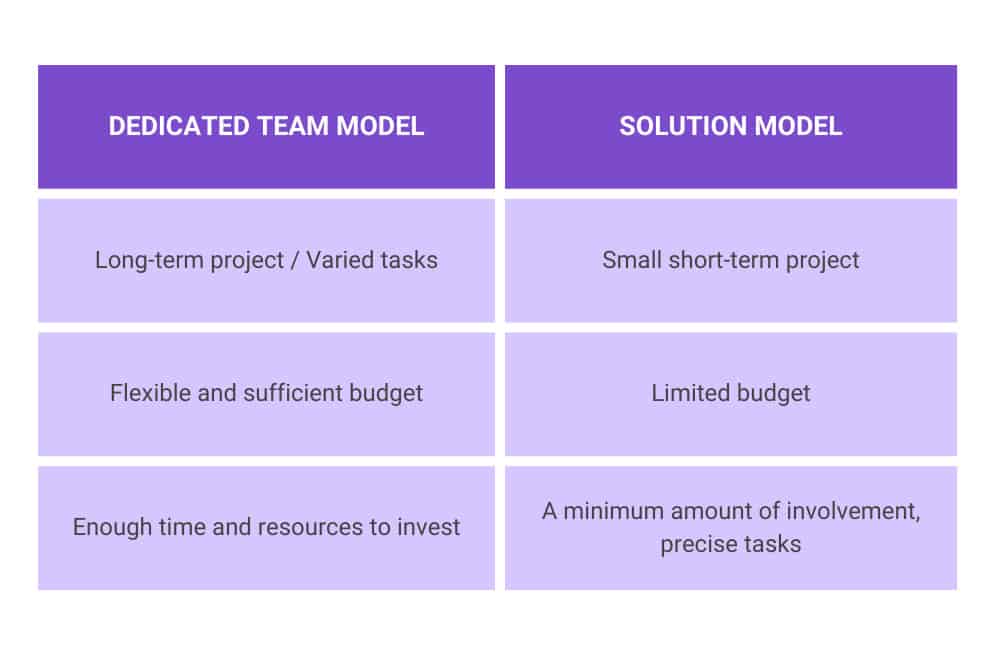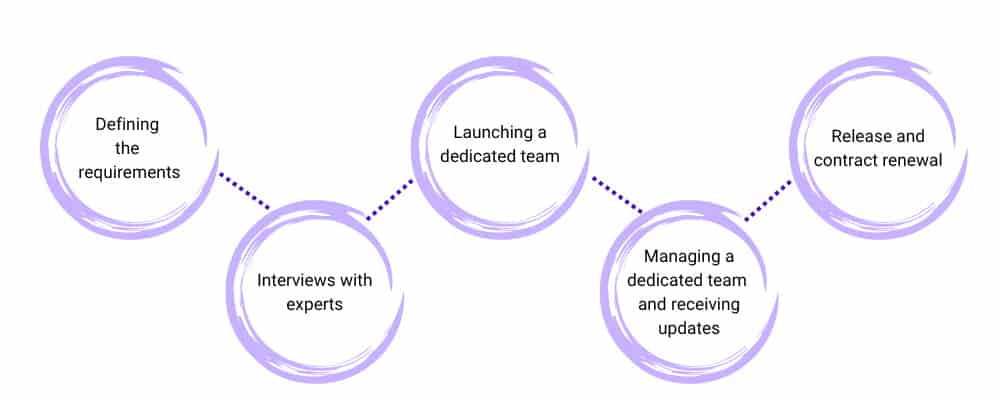The success of a project depends a lot on the team behind it. Working with dedicated teams has many advantages, being one of the most important that you can get an excellent job done in less time and with better quality.
It’s no secret how beneficial excellent teams can be. Better productivity, innovations and creativity, efficient distribution of tasks—these things only begin to touch all the advantages that come with teamwork. But what exactly is a dedicated team? How do they differ from other outsourcing models? Do you personally need one? In this article, we’ll answer these questions and more!
Here you have 5 Questions You Should Ask Before You Hire a Dedicated Team.
What is a Dedicated Team?
Dedicated Teams is a service that provides you with your own remote team of hand-picked individuals who focus solely on a single company’s software development project. This approach is often called “outstaffing” or “staff augmentation.”
An important distinction between outsourcing and dedicated teams lies in the level of responsibility each party has for a project. When you outsource a project, you typically hire a third party with its own code of conduct and culture. The firm takes full responsibility for the project from draft to implementation, and it’s understood that the people involved will juggle multiple projects from different clients at the same time. It’s not uncommon for some to pull 16-hour shifts or more in order to satisfy the needs of several clients.

Dedicated team members work for you, in your office or remotely, and are solely devoted to your project. With a dedicated team, you have more control over your processes and the time of your team members. You have complete control over their activities and what projects they work on. If a mistake is made by one of your dedicated team members, you are solely responsible for fixing that mistake.
The Typical Dedicated Team Structure
You can build your own team structure. You have the option to use a dedicated team model, or even opt for a one-person dedicated team. Your team can be made up of many different specialists, such as WordPress experts and data operators, or you can choose to have only one member—such as a Front-end developer. Whatever works best for you!
It’s best to choose a model with developers if your vision is clear and you want to manage the team directly. If you’re not sure about what you want, it’s better to get a PM involved in the project.
The Pros and Cons of a Dedicated Team Model
There are a number of advantages and disadvantages to working with a dedicated team. Let’s start with the advantages:
- Scalability: Hiring a dedicated team means that you can adjust its size to meet your project needs. You can even start by hiring one dedicated developer and then scale the team up as your project grows. Another great thing about dedicated teams is that if your project needs change, you can also scale it down.
- Flexibility: Each member of your team is an expert in his or her field, and they work together to bring a broad range of experience and expertise to each project. Since dedicated teams don’t have to divide their attention across multiple projects, they remain agile and maintain the ability to adjust to your schedule. This enables the freedom to set convenient times for video calls, negotiate deadlines, and receive reports on what work they are doing—meaning you can get the information you need when it’s convenient for you.
- Loyalty: When you choose to hire your team members personally, you get to know each specialist and their interests firsthand. This approach will help you build a more meaningful collaboration and team relationship over time. Entrusting individuals with clear responsibilities becomes a leadership tool for achieving high efficiency. According to research, loyalty, job satisfaction, and other workplace factors have a huge impact on the ROI of your business. Purely from a hiring standpoint, it’s not cheap to run perpetual vacancies, not to mention how draining it can be.
- Cost reduction: Modern business models have created a new way to reduce production costs, including outsourcing and nearshoring. When you build an external offshore team, you can reduce administrative, recruitment and retention expenses. You’ll also have less hassle building up the infrastructure that comes with building a team, like office management and human resources, as well as IT support.
- Communication: A dedicated staff eliminates many of the managerial layers you would have to navigate in a traditional business. You can talk directly to them whenever you need them, which is not only beneficial but also essential for your project’s success.
- Values: Dedicated teams are similar to in-house teams in that they share the values, culture, and objectives of their clients. This is complemented by the values and culture of their host’s organization. Finding a good match is essential for a smooth collaboration.
The dedicated team model has a few disadvantages, but that shouldn’t stop us from using it:
- Time consumption: It takes time to hire a good team. You need to be involved in the hiring process and invest resources in team development in order to build a squad of professionals that will take your project to the next level. These efforts are completely worth it, as you will receive devoted professionals who work at the perfect cost-quality ratio.
- Long-term projects often require more time and effort than shorter ones: Dedicated teams can handle short-term projects just as well as long-term ones. The only difference is that they shine brighter when given a long-term perspective.
How To Know If You Need A Dedicated Team Model
It’s a big step to rely on people outside your organization. Your desire to be sure you really need this type of help is natural. In order to decide, you can start by defining the kind of project you’re working on right now. If it is large and long-term with a variety of tasks and a need for high-quality deliverables, then a dedicated team model might be right for you. However, if your project is small and time-limited with predetermined resources, then you should opt for another kind of cooperation model like Software Solutions.
The other thing to think about is your budget. If you are working with a limited, strictly-planned budget, a dedicated team model may not be the best option for you.
Here’s a quick checklist to help you decide if a DT model is right for you:

What should I do first? What is the process?
This is how the dedicated team at Code First Lab works.

1. Defining the requirements
Contact your outsourcing partner and present your business idea to them, then get the company’s tech stack to find out what software developers they have in-house, who are also a good fit both culturally and technically.
2. Interviews with experts
When you want to get involved in the hiring process, you can always conduct interviews with your candidates. The vendor will conduct technical and HR interviews with each candidate to confirm their skills and motivation. Only after screening will you receive a list of candidates that can be a good fit for the project.
The hiring process is also a good opportunity to assess your outsourcing company. Check if they met your requirements and expectations, what style they use for internal communication, and what the overall culture in their office is like. This will help you make a more informed decision. Once you’ve chosen software developers, don’t pay them before the work is done, and insist on signing NDAs before interviews are held.
3. Launching a dedicated team
If interviews go well, you will have a group of people who can get the job done. The launch will be quick and easy and it will give you time to focus on other goals.
4. Managing a dedicated team and receiving updates
You can choose the level of involvement that suits your style of business. You might prefer daily updates, or you may want to give your Project Managers and software developers complete freedom in their work, but still receive updates when you need them.
5. Release and contract renewal
After the experts complete their part of the job, you can draw some conclusions on how well this model has performed in relation to your project. You will have a much better chance of getting a bigger contract, increasing your income and gaining more respect from your peers if you continue to use this model in the future.
Wrapping Up
Managing a dedicated team requires wisdom in leadership and dedication. You must be willing to communicate and bridge physical distances in order to make this type of relationship work. When you do, you’ll find that it enhances your inspiration and productivity while adding an additional layer of business optimization.
Contact us to learn how we can help you extend your technology team for sustainable growth.
#dedicatedteam #teamwork #team #outsourcing #organization #hiring #recruiting #teamextension #staffaugmentation #outstaffing #staffing #growth #softwarecompany #atlanta



